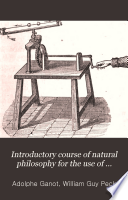 | Harvey Goodwin (Bishop of Carlisle.) - 1851 - 414 pages
...a system is, the more slowly it will raise a weight. T. Certainly ; and this principle is commonly expressed by saying that what is gained in power is lost in time. This principle applies not only to pullies but to all mechanical combinations whatsoever. I shall... | |
 | American cyclopaedia - 1861 - 804 pages
...as that of " virtual velocities," or of "equality of moments" of the power and load, and familiarly expressed by saying that what is gained in power is lost in velocity or in time, is, calling v the velocity of the weight, and V that of the power, formulated thus: P :... | |
 | Adolphe Ganot - Physics - 1865 - 518 pages
...or less than the resistance. We say in common language Between the power and velocity? that there is a loss of power in using a lever of the third class....no real gain of power in the employment of a lever. Examples of Levers. 33. Levers are of continual use in the arts, forming .component parts of nearly... | |
 | William Guy Peck - 1866 - 356 pages
...point of application of the resistance, as the resistance is greater than the power. This is generally expressed by saying, that what is gained in power is lost in velocity. We see, therefore, that no power is^ or can be, gained ; the only function of a machine being to enable... | |
 | Adolphe Ganot - Physics - 1875 - 516 pages
...power in using a lever of the third class, and a gain of power in using one of the second class. f In performing any work with a lever, the paths passed...no real gain of power in the employment of a lever. , Examples of Levers. 32. Levers are of continual use in the arts, forming component parts of nearly... | |
 | Adolphe Ganot - Physics - 1875 - 826 pages
...class. In performing any work with a lever, the paths passed over by the points of application of tlie power and resistance are proportional to their lever...and the greater its velocity. This is expressed by faying. that what is gained in power is lost in velocity. It is for this reason that we say there is... | |
 | Robert Routledge - Inventions - 1893 - 732 pages
...in. This is an illustration of a principle holding good in ail machines, which is sometimes vaguely expressed by saying that what is gained in power is lost in time. In this case we have the piston, b, moving through the space of I in. in the same time that the... | |
 | William Briggs, George Hartley Bryan - Statics - 1894 - 254 pages
...to move its point of application through 10 ft. to raise the weight through 1 ft. This is sometimes expressed by saying that " what is gained in power is lost in speed." In more accurate language, mechanical advantage is always obtained at the expense of a proportionate... | |
 | George Albert Wentworth, George Anthony Hill - Physics - 1898 - 456 pages
...also the point of application of Q will move in the same ratio slower than that of P. This is commonly expressed by saying that what is gained in power is lost in speed. 208. Waste Work. In every actual machine there exist certain resistances that have to be overcome,... | |
 | William Watson - Physics - 1920 - 590 pages
...through which the effort acts must be large compared to the displacement of the load. This is often expressed by saying that "what is gained in power is lost in speed." The ratio p/w is often called the mechanical advantage or velocity ratio of the machine. When... | |
| |